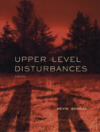Upper Level Disturbances
Kevin Goodan’s new collection of poetry, Upper Level Disturbances, takes us deep into the forests and fields of an unpopulated landscape. The solitary wanderer who narrates this collection depicts an outdoor world of animals and weather, rivers and fires, ghosts and slaughter. Rarely are we sheltered from the elements or in the presence of other humans, which creates a lonely shadow of observation. Throughout, the ghost of the speaker’s father haunts the perceptions of his weather-ruled world.
Kevin Goodan’s new collection of poetry, Upper Level Disturbances, takes us deep into the forests and fields of an unpopulated landscape. The solitary wanderer who narrates this collection depicts an outdoor world of animals and weather, rivers and fires, ghosts and slaughter. Rarely are we sheltered from the elements or in the presence of other humans, which creates a lonely shadow of observation. Throughout, the ghost of the speaker’s father haunts the perceptions of his weather-ruled world.
It is unfortunate that Goodan’s book begins with the most abstract poems and unnecessarily confusing titles, as in “What Indices Have Blurred Me,” so that instead of helping to ease us into the wilderness in his poetry, we are confused by the opaque naming of where we are. These poems only begin to make sense after reading the rest of the collection. The titles and poems move towards clarity of description and infusion of meaning as the book moves forward. Fire gives way to harvest, which leads to slaughter and finally to memory.
One of the more surprising elements of the collection is the five poems that give grisly details of a slaughterhouse. These poems offer a stark contrast to the themes of nature and memory, especially as we encounter the first, “Untitled,” nearly halfway through the book. But upon reading the fourth and fifth, also “Untitled,” the consistency and repetition of the images create a familiarity which leaves behind the initial sickening feeling. The violence of butchering correlates finally to the death that happens in fields and forests, in the survival of other species, although the connection is formed through the relationship of the poems surrounding the slaughter poems. From the last “Untitled”:
In the dream I come back to slaughter—
Gelid blood upon me, bone flecks, ingots of tallow
Stacked in the cold-room, sawdust fresh and bloodless
And fragrant in the chill beneath the halves of beasts—
The book does not offer us an abundance of great lines, but there are little gems throughout. Certainly, Goodan expands the normal identifying names of natural things. From “Album”: “We will crack our bones for the marrow if we let it / And we must let it. As a snag stands, smolders still. / As a questing of starlings sprail before me.”
It is fair to say Goodan is a nature poet of a certain type. He’s unsentimental in his descriptions, but not quite as fiercely intense as someone like Robinson Jeffers—neither does he infuse nature with emotion, as Mary Oliver does. There is a detached, observational tone which makes the fields and forests seem less ominous and more a part of his home, even as they are burning. Finally, at the end of the book, we are given some answers to help explain the speaker’s sense of searching by allowing in flashes of memory:
Where mist borne out of stubble
Will turn to frost soon,
Which is the beauty of not going on,
Of not my home. Hear gunshots
And realize the hazards contained
In the ideas of hope, am learning
How far sound can carry
In this geography, this departure.
—“Trying to Remember”
The gentle, consistent descriptions of the natural world are what drive this collection forward. The conclusions and abstractions are sparse, which lends them weight. However, this is not a heavy book, despite the aloneness, the ghosts, and the carcasses. It is reminiscent of how the senses come alive when in an environment devoid of people and how the sense of tragedy in the destruction of things becomes merely a human perspective.





